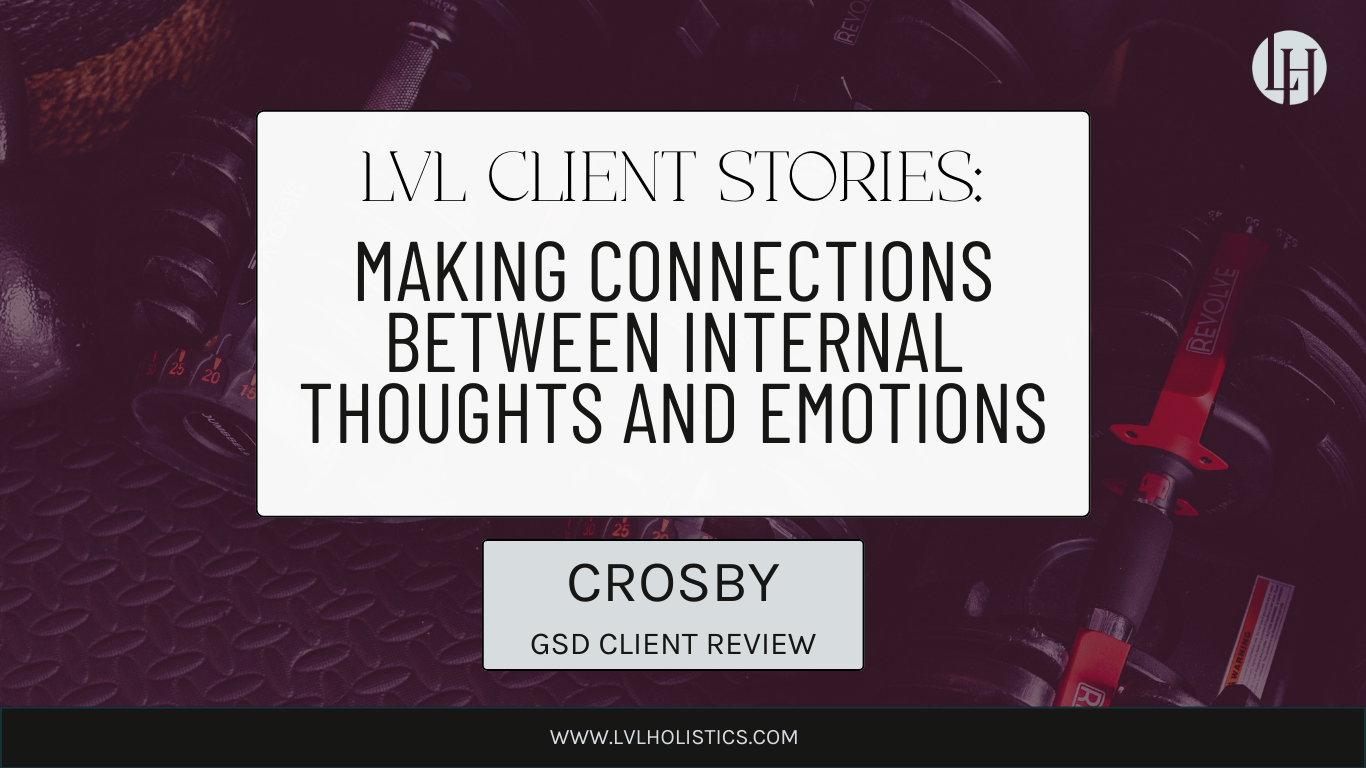LVL CLIENT STORIES: Making Connections Between Internal Thoughts and Emotions
Crosby's GSD Breakthrough
You know that voice in your head? The one that provides running commentary on everything you eat, how you look in the mirror, and whether you're "being good" with your health choices today?
Yeah, that voice. We've all got one.
For some of us, it's a gentle nudge toward healthier choices. But for many women, it's become a harsh critic that makes every food decision feel loaded and every glimpse in the mirror feel like a judgment.
Crosby’s story of transformation—both physical and mental—perfectly illustrates why our approach goes so much deeper than just telling you what exercises to do.
Breaking the Pendulum Swing
One of the first things Crosby shared about her GSD experience was something that might sound small, but is actually huge:
"I accomplished my movement goal and I didn't completely swing the opposite of eating healthy (in the past, I would have gotten all the take out and 'treated' myself constantly)."
If you've ever been caught in the cycle of "being good" followed by "treating yourself" with food, you know exactly what she's talking about.
The fact that Crosby maintained some balance—that she didn't swing to the opposite extreme—shows real progress. It means she was developing a more sustainable relationship with food, one that doesn't require perfection to be maintained.
This didn't happen by accident. GSD accounts for those inevitable challenges, and provides you with the tools to successfully navigate those moments, to create new thoughts and habits to achieve your goals.
The Power of Evidence-Based Education
What I love about Crosby's experience is how much she appreciated the educational component of GSD:
"In GSD you get a lot of evidence-based education and you learn how to tailor the content based on what the group is asking for or what you personally need."
This is so important, and here's why: we're constantly bombarded with conflicting health and fitness advice.
Should you do cardio or strength training?
Are carbs good or bad?
Is intermittent fasting right for everyone?
Without a foundation of evidence-based knowledge, it's easy to get swept up in the latest trends or feel paralyzed by all the contradictory information out there.
But when you understand the science behind the recommendations—when you know why we suggest certain approaches and how to adapt them for your specific situation—you become empowered to make informed decisions rather than just following rules blindly.
As Crosby noted: "I love the evidence-based education as well as the knowledge and flexibility the coaches provide. They take this seriously--these are legit programs they put a lot of time into."
This isn't just thrown-together content or recycled Instagram posts. This is carefully crafted programming based on research and years of practical experience helping real women achieve sustainable results.
The Real Breakthrough: Connecting Thoughts and Emotions
But perhaps the most significant part of Crosby's journey happened around week three:
"3 weeks in, I was making connections between my internal thoughts about my body/weight, and the negative impact it was having on my emotions."
Most fitness programs focus exclusively on the external:
What you should eat
How you should move
When you should sleep
But they completely ignore the internal dialogue that’s driving so many of our choices.
When Crosby started noticing the connection between her thoughts and her emotions, she gained access to a level of change that goes far beyond surface-level habit modification. She started understanding why certain situations triggered certain behaviors, and more importantly, she gained the power to choose different responses.
"I've really noticed and worked hard to change my negative self talk about my body (on most days)," she shared. "This has been pretty significant for me."
"Pretty significant" might be the understatement of the year. Learning to speak to yourself with compassion instead of criticism isn't just about feeling better in the moment—it fundamentally changes how you approach your health and wellness journey.
When you're not constantly battling negative self-talk, you have more mental energy available for actually taking care of yourself.
When you're not beating yourself up for perceived failures, you can get back on track more quickly.
When you approach your body with respect rather than resentment, healthy choices start feeling like self-care rather than self-punishment.
The Flexibility Factor
One of the things Crosby emphasized was how much she appreciated the adaptability of the program:
"I really enjoy working with the coaches and appreciate that the program is adaptable."
This is crucial because life doesn't pause for your health goals. Kids get sick, work gets busy, unexpected challenges arise. A rigid program that can't bend with life's realities is destined to break.
But a program that can adapt—that meets you where you are and helps you figure out what's possible in your current circumstances—that's a program you can stick with long-term.
Why This Approach Works
What makes Crosby's story so powerful isn't just that she achieved her movement goals or maintained better eating habits. It's that she developed a completely different relationship with herself and her body in the process.
She learned to:
Make connections between her thoughts and emotions
Adapt evidence-based strategies to her personal needs
Maintain balance without swinging to extremes
Speak to herself with more compassion
These aren't just nice-to-have bonuses—they're the foundation that makes all the other changes sustainable.
Is GSD Right for You?
If Crosby's story resonates with you—if you're tired of the pendulum swing between "perfect" and "completely off track," if you want to understand the why behind health recommendations, if you're ready to address not just what you do but how you think about yourself—GSD might be exactly what you've been looking for.
As Crosby's experience shows, this isn't just about changing your habits. It's about changing your entire relationship with health, food, movement, and most importantly, yourself.
You deserve an approach that's as thoughtful and complex as you are. And you deserve to speak to yourself with the same kindness you'd show a good friend.


